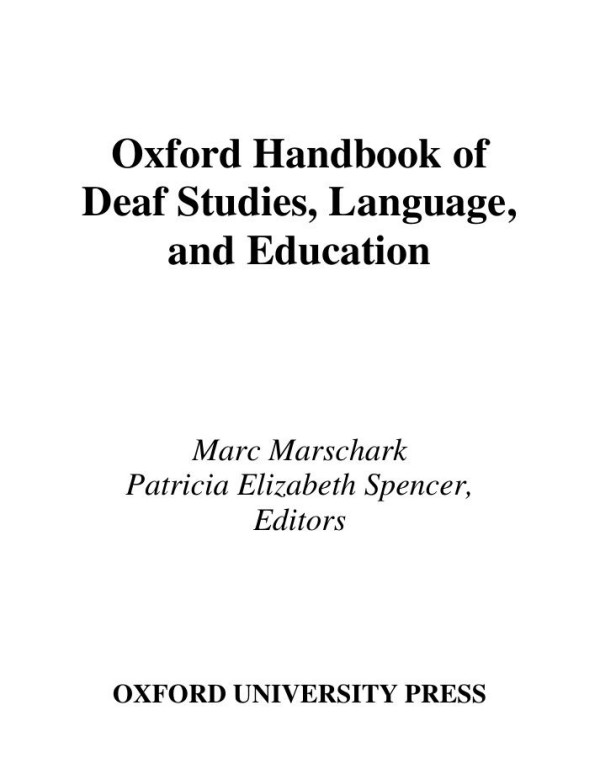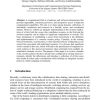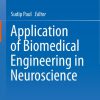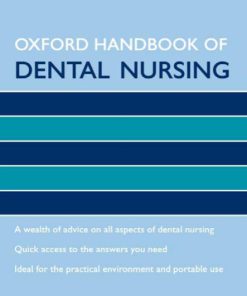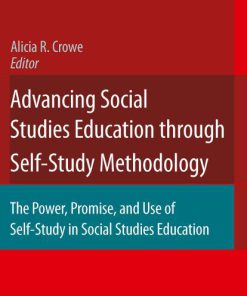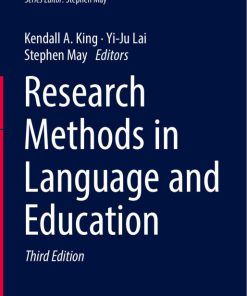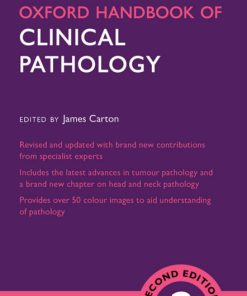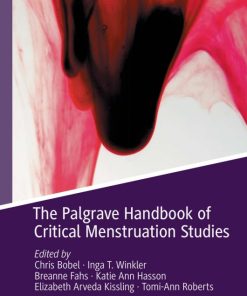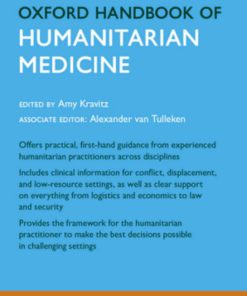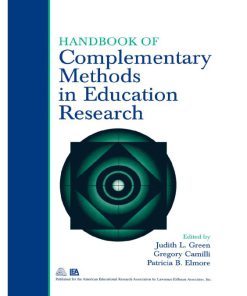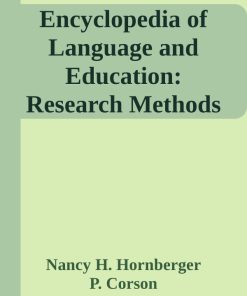Oxford Handbook of Deaf Studies Language and Education 1st edition by Marc Marschark, Patricia Elizabeth Spencer ISBN 0195149971 978-0195149975
$50.00 Original price was: $50.00.$25.00Current price is: $25.00.
Authors:Marschark, Marc.; Spencer, Patricia Elizabeth. , Series:Education [386] , Author sort:Marschark, Marc.; Spencer, Patricia Elizabeth. , Languages:Languages:eng , Published:Published:Apr 2005 , Publisher:Oxford University Press
Oxford Handbook of Deaf Studies, Language, and Education 1st edition by Marc Marschark, Patricia Elizabeth Spencer – Ebook PDF Instant Download/Delivery. 0195149971 978-0195149975 978-0195149975
Full download Oxford Handbook of Deaf Studies, Language, and Education 1st edition after payment

Product details:
ISBN 10: 0195149971
ISBN 13: 978-0195149975
Author: Marc Marschark, Patricia Elizabeth Spencer
In Plato’s cratylus, which dates to 360 B.C., Socrates alludes to the use of signs by deaf people. In his Natural History, completed in 79 A.D., Pliny the Elder alludes to Quintus Pedius, the deaf son of a Roman consul, who had to seek permission from Caesar Augustus to pursue his training as an artist. During the Renaissance, scores of deaf people achieved fame throughout Europe, and by the middle of the 17th century the talents and communication systems of deaf people were being studied by a variety of noted scientists and philosophers. However, the role of deaf people in society has always been hotly debated: could they be educated? Should they be educated? If so, how? How does Deaf culture exist within larger communities? What do advances in the technology and the genetics of hearing loss portend for Deaf communities?
In this landmark volume, a wide range of international experts present a comprehensive and accessible overview of the diverse field of deaf studies, language, and education. Pairing practical information with detailed analyses of what works, why, and for whom, and banishing the paternalism once intrinsic to the field, the handbook consists of specially commissioned essays on topics such as language and language development, hearing and speech perception, education, literacy, cognition, and the complex cultural, social, and psychological issues associated with individuals who are deaf or hard of hearing. Through careful planning, collaboration, and editing, the various topics are interwoven in a manner that allows the reader to understand the current status of research in the field and recognize the opportunities and challenges that lie ahead, providing the most comprehensive reference resource on deaf issues.
Written to be accessible to students and practitioners as well as researchers, The Oxford Handbook of Deaf Studies, Language, and Education is a uniquely ambitious work that will alter both theoretical and applied landscapes. It surveys a field that has grown dramatically over the past 40 years, since sign languages were first recognized by scientists to be true languages. From work on the linguistics of sign language and parent-child interactions to analyses of school placement and the mapping of brain function in deaf individuals, research across a wide range of disciplines has greatly expanded not just our knowledge of deafness and the deaf, but of the very origins of language, social interaction, and thinking. Bringing together historical information, research, and strategies for teaching and service provision, Marc Marschark and Patricia Elizabeth Spencer have given us what is certain to become the benchmark reference in the field.
Oxford Handbook of Deaf Studies, Language, and Education 1st Table of contents:
Part I: Foundations of Deaf Studies and Language
-
Introduction to Deaf Studies
- The history and evolution of Deaf studies as an academic field
- Key concepts and interdisciplinary approaches to Deaf studies
- The social model of deafness versus the medical model
- Deaf identity, culture, and community
-
The Linguistics of Deaf Languages
- Overview of sign languages around the world
- Linguistic features of sign languages: Phonology, syntax, morphology, and semantics
- The role of sign language in Deaf identity and culture
- The linguistic status of sign languages in global contexts
-
Deaf Language Acquisition
- Language development in Deaf children
- Early exposure to sign language vs. oral language
- The role of Deaf adults and Deaf community in language acquisition
- Bilingualism: Sign language and spoken language acquisition
-
Cognitive and Psychological Aspects of Deafness
- Cognitive development in Deaf children
- Psychological theories related to Deaf children’s learning and development
- The effects of delayed language exposure on cognitive abilities
- Language and cognitive abilities in Deaf adults
Part II: Educational Approaches and Practices
-
History of Deaf Education
- The evolution of educational approaches for Deaf individuals
- Oralism vs. manualism debates
- The establishment of Deaf schools and their role in Deaf culture
- Legal and policy developments in Deaf education
-
Curriculum and Pedagogy in Deaf Education
- Curriculum design for Deaf students
- The role of sign language in the curriculum
- Effective teaching strategies for Deaf students
- Inclusive education and Deaf students in mainstream schools
-
Bilingual Education for Deaf Students
- The philosophy and practice of bilingual-bicultural education
- Teaching sign language alongside spoken language
- The role of sign language as a bridge to academic content
- Policy and implementation challenges in bilingual Deaf education
-
Technological Advances in Deaf Education
- The impact of technology on Deaf education
- Assistive technologies: Hearing aids, cochlear implants, and captioning services
- The role of multimedia and digital learning tools in Deaf education
- Distance education and online learning for Deaf students
Part III: Social, Cultural, and Community Perspectives
-
Deaf Culture and Identity
- Defining Deaf culture: Values, norms, and traditions
- The role of Deaf schools in fostering Deaf culture
- Deaf identity: How language and culture shape identity
- The intersectionality of Deaf identity with race, gender, and disability
-
Deaf Communities and Social Interaction
- The structure and dynamics of Deaf communities
- Social networks and communication within the Deaf community
- The importance of Deaf clubs, social gatherings, and events
- The role of Deaf role models and leaders
- Deaf Empowerment and Advocacy
- The history of the Deaf rights movement
- Legal and political advocacy for Deaf individuals
- Advocacy for Deaf education and accessibility
- The role of Deaf advocacy organizations globally
Part IV: Contemporary Issues and Future Directions
- Deaf Education and Policy
- Current trends in Deaf education policies worldwide
- Legal frameworks supporting Deaf education: IDEA (Individuals with Disabilities Education Act) and others
- Challenges in providing quality education to Deaf students in various countries
- The future of Deaf education policy
- The Impact of Cochlear Implants and Technology on Deaf Education
- The controversy over cochlear implants and Deaf culture
- The integration of cochlear implants into educational settings
- Ethical debates surrounding cochlear implants in children
- The role of technology in bridging educational gaps for Deaf students
- Global Perspectives on Deaf Education
- Deaf education in different parts of the world
- Cross-cultural differences in Deaf education practices
- Global challenges and opportunities for Deaf learners
- Collaborative efforts in international Deaf education initiatives
- The Future of Deaf Studies, Language, and Education
- Emerging research in Deaf studies and language acquisition
- The integration of new technologies into Deaf education
- The role of Deaf scholars and educators in shaping future research and practice
- The ongoing development of inclusive, equitable educational practices for Deaf individuals
People also search for Oxford Handbook of Deaf Studies, Language, and Education 1st:
oxford handbook of deaf studies
oxford handbook of deaf studies language and education
the oxford handbook of deaf studies in language
oxford handbook of deaf studies in literacy
oxford handbook of language and sexuality
You may also like…
eBook PDF
Oxford Handbook of Clinical Pathology 2nd edition by James Carton ISBN 0198759584 978-0198759584
eBook PDF
Oxford Handbook of Humanitarian Medicine 1st edition by Amy Kravitz ISBN 0199565279 978-0199565276

